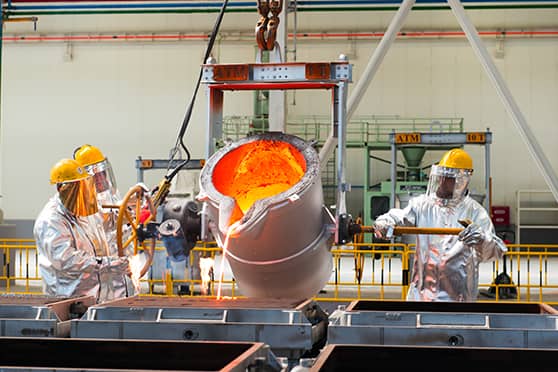Summary
Metallurgical Engineering deals with the physical and chemical properties of metals, metallic compounds and alloys
Jadavpur University, IIT Kharagpur and IIEST Shibpur offer both bachelor’s and master’s courses
Are you fascinated by metals and the ways in which they can be moulded for heavy industries? Then a career in Metallurgical Engineering can be the perfect way to investigate and examine the properties of metals so that they could be used to produce a range of useful products and materials.
What is Metallurgical Engineering
Metallurgy combines the science and technology of metals — it explores the microstructures of a metal and tries to find out how they influence its mechanical properties. The subject also involves the physical and chemical properties of metallic elements, compounds and alloys. It also covers metal-related technologies used to extract metals from the surface of the earth as well as metalworking processes like casting, forging and sintering.
Studying Metallurgical Engineering
- You need to clear your Class XII board exams or an equivalent exam with Physics, Chemistry and Maths as compulsory subjects. You need at least 75% marks for admission to IITs, NITs and GFTIs.
- You need to clear JEE Mains, conducted by the National Testing Agency (NTA), for admission to NITs, CFTIs and other engineering institutes.
- You need to clear JEE Advanced to get into IITs and IIT (ISM) Dhanbad. To be eligible for JEE Advanced, you need to be among the top 2,50,000 successful candidates (across all categories) in the BE/BTech paper of JEE Mains.
- You can get a Metallurgical Engineering degree by clearing any of the state joint entrance exams.
- For a master’s degree in Metallurgical Engineering, you need to clear GATE (Graduate Aptitude Test in Engineering).
Types of Metallurgical Engineering
- Chemical Metallurgy: It involves the extraction of usable metals, metal corrosion and metal fatigue. It is mostly concerned with reduction, oxidation and the chemical performance of metals.
- Physical Metallurgy: It deals with the behaviour of metals under stress and their reactions in different temperatures. Inventing and improvising manufacturing techniques are part of this discipline.
- Process Metallurgy: It involves the shaping of metals and alloy parts using methods like casting, welding, forging and soldering.
Some top institutes to study Metallurgical Engineering:
Jadavpur University, West Bengal
Course: BE in Metallurgical Engineering.
- Duration: Four years.
- Admission: Depends on your rank in WBJEE (West Bengal Joint Entrance Examinations).
Course: ME in Metallurgical Engineering.
IIT Kharagpur, West Bengal
Course: BTech in Metallurgical Engineering.
- Duration: Four years.
- Admission: Depends on your rank in JEE Advanced.
Course: BTech+MTech (Dual) in Metallurgical Engineering.
- Duration: Five years.
- Admission: Depends on your academic performance during the bachelor's degree.
Course: MTech in Metallurgical Engineering.
IIEST Shibpur, West Bengal
Course: BTech in Metallurgical Engineering.
- Duration: Four years.
- Admission: Depends on your rank in JEE Mains.
Course: MTech in Metallurgical Engineering.
NIT Durgapur, West Bengal
Course: BTech in Metallurgical Engineering.
- Duration: Four years.
- Admission: Depends on your rank in JEE Mains.
Course: MTech in Metallurgical Engineering.
NIT Surathkal, Karnataka
Course: BTech in Metallurgical Engineering.
IITs (Indian Institute of Technologies), Multiple locations
Course: BTech in Metallurgical Engineering.
- Duration: Four years.
- Admission: Depends on your rank in JEE Advanced.
Course: MTech in Metallurgical Engineering.
- Duration: Two years.
- Admission: Depends on your GATE rank.
Job roles with a Metallurgical Engineering degree:
- Plant equipment engineer: They are in charge of the planning, design, installation and upkeep of industrial plant power systems. These professionals resolve technical maintenance issues, ensuring a safe and efficient working environment for all employees. They also evaluate production activities and analyse the performance of the related machinery.
- Quality planning engineer: They monitor, test and report the quality of metallic products. It’s their job to inspect raw materials, components, mechanical systems and final products.
- Senior process engineer: They are in charge of metallic products' process, efficiency, effectiveness, quality and safety. They are also responsible for pointing out any area that could be improved.
- Metallurgical lab technician: They conduct tests on metals and other elements to find engineering solutions to industrial problems. They operate and maintain machinery used in manufacturing.
- Welding engineer: They create new welding procedures, equipment and other items. They plan, supervise and document welding activities in industrial plants.
Last updated on 11 Mar 2022

